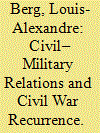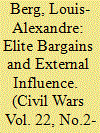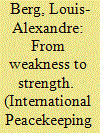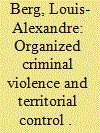| Srl | Item |
| 1 |
ID:
173133


|
|
|
|
|
| Summary/Abstract |
Does restructuring security forces reduce the risk of civil war recurrence? Prior research has examined effects of military integration in alleviating commitment problems, but the evidence has been inconclusive. Other aspects of civil–military relations have received less attention. This article examines the effects of civil–military relations in the context of postwar struggles to consolidate authority. It outlines three pathways through which security forces contribute to renewed civil war: by excluding rival factions and facilitating insurgent mobilization, by exploiting control over resources to challenge the regime, or by escalating incipient insurgency through repression. Analysis of original, cross-national data on postwar civil–military relations shows that reducing the potential for exclusion and exploitation through diverse officer appointments and robust civilian oversight lowers the risk of civil war. These findings emphasize the distributive effects of restructuring security forces and highlight the value of examining political contests around state institutions to understand why civil wars restart.
|
|
|
|
|
|
|
|
|
|
|
|
|
|
|
|
| 2 |
ID:
172858


|
|
|
|
|
| Summary/Abstract |
This article explores how elite bargains affect external influence over civil-military relations. It argues that opportunities for security assistance arise from fragmented post-war coalitions and negotiations among rival factions. In post-civil war Liberia and Sierra Leone, the role of security assistance reflected bargains struck by ruling elites to consolidate their authority. Politicians used external backing to maintain fragmented coalitions while neutralising threats from factionalised armed forces. Reliance on security assistance enabled external influence through conditioning aid, delegated control, and day-to-day interaction. These cases highlight the importance of examining internal politics to explain the effects of security assistance.
|
|
|
|
|
|
|
|
|
|
|
|
|
|
|
|
| 3 |
ID:
133135


|
|
|
|
|
| Publication |
2014.
|
| Summary/Abstract |
The mixed results of efforts to reform the governance of security forces in the aftermath of conflict require deeper examination of the political constraints that shape statebuilding processes. In Bosnia and Herzegovina, attempts to restructure and centralize the security forces led to a substantial though incomplete reform of the military, but limited impact on the police forces. These uneven results are rooted in the nature of political coalitions that constrain recipient leaders and shape their interaction with external actors. While Bosnian leaders mostly relied on a cohesive political base that favoured close links between political parties and the police forces, fragmentation within these parties generated internal threats that enabled reforms to the military. This case demonstrates the limits of external influence without changes to underlying political conditions.
|
|
|
|
|
|
|
|
|
|
|
|
|
|
|
|
| 4 |
ID:
161548


|
|
|
|
|
| Summary/Abstract |
What accounts for geographic variation in organized criminal violence? In Honduras, a country with one of the highest homicide rates in the world, the intensity of violence rivals many civil wars. Yet violent crime varies across cities and neighborhoods. Armed groups seeking to control territory use violence for different purposes, including competing against rivals, coercing residents and state officials, and exploiting the public for profit. Variations in community organization, defined as the density of interpersonal ties and the prevalence of shared expectations for collective action, affect the utility of violence for each of these purposes. Community organization can raise the cost of controlling territory, reduce the benefits of coercive violence, and generate pressure to protect residents from exploitation. These dynamics are examined through a comparison of nine neighborhoods in three of Honduras’s most violent cities, drawing from disaggregated homicide data and ethnographic research. The comparison shows that neighborhoods with denser community organization experienced lower levels of violence. Narrative evidence points to specific ways in which community organization mediates effects of competition among criminal groups and their interaction with state officials. Community characteristics thus affect the way non-state armed actors exercise authority in areas of limited state presence.
|
|
|
|
|
|
|
|
|
|
|
|
|
|
|
|